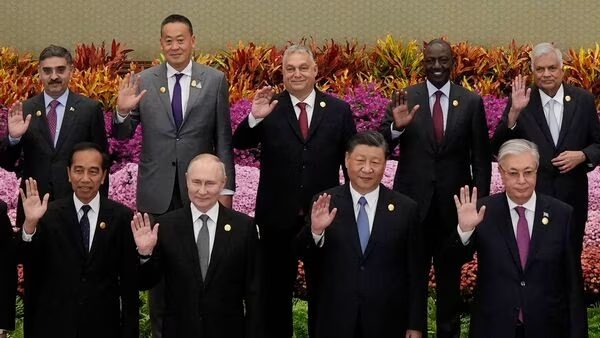China’s “most important diplomatic event” of the year was held in Beijing. Top leaders around the world gathered for a series of bilateral meetings. This year marked its third edition though comparatively only 23 heads of state and government were present. One of the key factors could be the major crisis unfolding in the Middle East. While Xi and Putin shared the China-Russia partnership as “a long-term commitment,” other leaders called for a more multilateral, cooperative world. The forum also highlighted the next phase of BRI, which enters its second decade.
On October 17th-19th, 2023, a two-day global gathering termed as China’s “most important diplomatic event” of the year wrapped up in Beijing. (CNN) Top leaders around the world gathered for a series of bilateral meetings and forums centered around Chinese President Xi Jinping’s flagship Belt and Road Initiative (BRI), an international infrastructure project that has solidified China’s position as a major player in the world since its inception ten years ago.
The BRI forum is a platform for developing action plans in the domains of trade and investment, infrastructure, energy and resources, production capacity, and identification of major projects. It is also meant to serve as an opportunity to sign cooperation agreements in the fields of financial cooperation mechanisms with countries and international organizations.
This year marked its third edition. However, compared to the previous session where 37 leaders were in attendance, this year just 23 heads of state and government were present. One of the key factors could be the major crisis unfolding in the Middle East which resulted in some leaders from the region staying in their respective regions. (The Diplomat)
Below are the key takeaway points from the forum:
- Putin’s Prominent Attendance: At the forum’s opening ceremony, Putin was one of the first leaders to speak. The Russian president emphasized his strong alignment with China both there at the forum and during their three-hour bilateral sessions with Xi later that day. Before leaving Beijing, Putin told reporters that he and Xi had addressed the “situation” in both the Middle East and Ukraine “in detail,” adding that the two nations‘ “common threats” boosted “Russian-Chinese interaction.”
In his meeting with Putin, Xi also hailed the China-Russia partnership as “a long-term commitment,” stressing “ever-lasting good neighborliness and mutually beneficial cooperation.”
- Deepening division between the world’s major powers: European dignitaries were among the important missing figures. Previously, Giuseppe Conte, Prime Minister of Italy at the time, as well as dignitaries from Greece, Austria, Portugal, and the Czech Republic, attended in 2019. Since then, Europe has grown more skeptical of China’s aspirations on a global scale, especially in light of Beijing’s diplomatic and economic backing for Moscow. Italy, the lone G7 participant in the BRI, is also thinking of pulling out when its membership ends next year.
International Leaders who attended included Hungary’s Viktor Orban, Kazakh President Kassym-Jomart Tokayev, Indonesia’s Joko Widodo, and others from Africa, Asia, and Latin America. The Taliban – which is not widely recognized as Afghanistan’s government – also sent a delegation.
Many leaders emphasized in their speeches their hopes to spur much-needed, sustainable development in their countries, while some also called for a more multilateral, cooperative world.
- Global relations impacted by the Middle East conflict: While the forum was ongoing the news of the Middle East War and the devastating blast at Gaza hospital left hundreds of displaced Palestinians killed by Israeli airstrikes. However, there was little discussion of the catastrophe in the forum. At the opening ceremony, not a single national leader brought up the war. Whereas United Nations Secretary-General António Guterres, mentioned the situation during his opening ceremony address, demanding an immediate humanitarian ceasefire.
However later the next day i.e., 19th October, Xi made his first public statement on the conflict since the attack. In a meeting with Egypt’s representative to the forum, the Chinese leader called for a ceasefire and an end to the war “as soon as possible,” while backing a two-state solution that would establish an independent Palestinian state.
Xi also said China is willing to strengthen coordination with Egypt and other Arab countries to “promote an early, comprehensive, and lasting solution to the Palestine issue,” (CCTV News)
- China emphasizes ‘high-quality’ global development: The forum also highlighted the next phase of BRI, which enters its second decade as China’s economic growth slows and borrowing costs have increased worldwide. Although Beijing claims the program has raised $1 trillion in funding, it has been accused of burdening developing countries with excessive debt and having detrimental effects on the environment. Despite this, the program has been significant in developing countries in building roads, bridges, ports, and trains.




